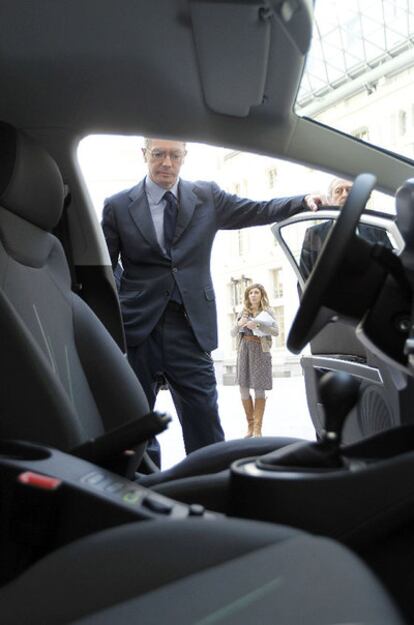Charging toward the future
The electric car seems to be the only way to reduce air pollution; but it's a long-term solution, given the current high cost and recharging issues
"The use of electric cars is not a hypothesis, it is a reality," said Madrid Mayor Alberto Ruiz-Gallardón earlier this week at a conference organized in the capital by German-owned car-maker Seat about the future of the electric vehicles. Electric cars may be a reality, but they aren't the answer right now, and it will be many years before the streets of Spain's cities are quieter and less polluted.
Juan Luis Plá is the head of the transport division of the Ministry of Industry, Tourism, and Trade, and a leading proponent of the use of electric cars. "Our cities will be the main beneficiaries of the electric car, which is quiet and pollution-free," he says. But Plá estimates that even by 2020, barely 10 percent of vehicles in Spain will be electric.
At present, there are around 2,500 electric vehicles in Spain, most of them used by municipalities for garbage collection, gardening, road cleaning or transport. So far, motorists have been slow to take up the growing range of electric vehicles, despite their impressive 175-kilometer radius. Some are already available in showrooms, but at a cost of around 30,000 euros, most will be staying there.
The problem with electric cars remains their batteries, which make up around half of the total price. It is estimated that within five years, this cost will have halved, say the experts.
Plá says that the next big challenge for cities looking to encourage the use of electric cars is how to recharge those batteries. A few small motorcycles are now available in electric models, and they take around 90 minutes to charge via a normal household socket and plug. In the case of cars, that time frame is likely to be several hours.
Apartment block car parking spaces will have to be fitted with electrical sockets, and garages will have to create space to charge cars. Cities will also have to install charging points that will allow vehicles to be topped up in under 10 minutes, giving drivers around 50 kilometers. "But most people will likely opt simply to charge their vehicles overnight," says Plá.
Madrid City Hall is already working with the Transport Ministry on the Movele electronic mobility project, which foresees greater cooperation with vehicle makers, along with tax breaks and other concessions to encourage people to buy electric cars. At the same time, the capital's fleet of buses is gradually being switched over to electric.
In the meantime, Madrid City Hall is avoiding making any suggestions as to how to reduce Madrid's alarmingly high levels of air pollution in the medium term. In response, the Socialist Party and the United Left opposition groups have seized on the issue.
Pedro Santín, the Socialist Party's environment spokesman in the capital, says that there is no question in the short-term of introducing a congestion charge but that he would limit the number of vehicles allowed to enter the city on days when air pollution was above safety limits. He believes that the solution is to gradually pedestrianize the center of the city, particularly in residential areas.
Santín also believes that part of the solution lies in offering low-cost, or even free, transport to move around the city. He also favors acting to prevent people from outside the city from parking their vehicles in the center, by extending the use of residents-only parking.
Ángel Pérez, United Left's mayoral candidate, believes congestion charges only affect the less wealthy, while the owners of large, polluting four-by-four vehicles would benefit. He says that Madrid City Hall has repeatedly refused to limit the number of vehicles entering the city on days when air pollution levels are high. He is highly critical of City Hall's road policy, which he says encourages people to bring their vehicles into the city, "only to then find themselves gridlocked."

Tu suscripción se está usando en otro dispositivo
¿Quieres añadir otro usuario a tu suscripción?
Si continúas leyendo en este dispositivo, no se podrá leer en el otro.
FlechaTu suscripción se está usando en otro dispositivo y solo puedes acceder a EL PAÍS desde un dispositivo a la vez.
Si quieres compartir tu cuenta, cambia tu suscripción a la modalidad Premium, así podrás añadir otro usuario. Cada uno accederá con su propia cuenta de email, lo que os permitirá personalizar vuestra experiencia en EL PAÍS.
¿Tienes una suscripción de empresa? Accede aquí para contratar más cuentas.
En el caso de no saber quién está usando tu cuenta, te recomendamos cambiar tu contraseña aquí.
Si decides continuar compartiendo tu cuenta, este mensaje se mostrará en tu dispositivo y en el de la otra persona que está usando tu cuenta de forma indefinida, afectando a tu experiencia de lectura. Puedes consultar aquí los términos y condiciones de la suscripción digital.








































